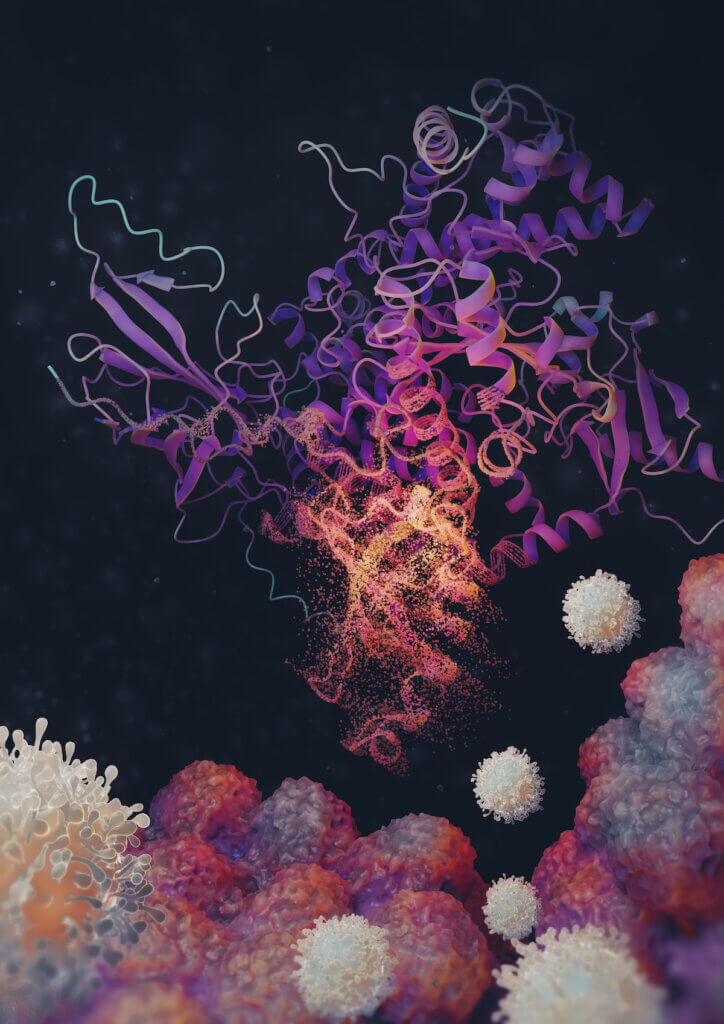In a branch of the PI3K protein family — with members named PI3Kα, PI3Kβ, PI3Kδ, and PI3Kγ — PI3Kβ was long treated as the proverbial middle child: neglected by cancer scientists in favor of its more prominent siblings.
In a new study, Dana-Farber researchers demonstrate that it doesn’t deserve its obscurity — that in fact it plays a key role in helping certain breast cancers duck an immune system attack, and that a combination of PI3Kβ-blocking drugs and immunotherapy agents could well be effective against these cancers.
The study, published in the journal Nature, involves triple negative breast cancers with a mutated form of the Pten gene, which account for approximately 30% of cases of the disease. PTEN is a tumor-suppressor gene, meaning it replies to the cell’s “grow, grow, grow” messages with a “not so fast” message of its own, keeping cell growth and division under control. When PTEN, the protein made from the PTEN gene, is missing or scarce because of a mutation or other problem with PTEN production, its steadying influence is weakened. Loss of PTEN can also dampen the immune response to cancer and make tumors less vulnerable to immunotherapy.
In a paper in 2008, Dana-Farber’s Jean Zhao, PhD, Thomas Roberts, PhD, the senior authors of the new study, and their colleagues reported that PTEN-deficient tumors often depend on PI3Kβ to grow and survive. What form that dependency takes — how PI3Kβ exploits the absence of PTEN to sustain and protect tumors — was unclear.
The new paper points to PI3Kβ’s entanglement with the immune system.
“The PI3K pathway [the series of gene and protein interactions sparked by PI3K] is critical for normal physiological function,” Zhao says. “Abnormal activity of this pathway occurs in a wide variety of tumor types, and it is the most frequently targeted pathway in cancer medicine.”

The arsenal of cancer drugs includes approved agents that target PI3Kα, PI3Kδ, and PI3Kγ, but none has yet been approved for PI3Kβ, befitting its reputation as the least consequential of the PI3K clan.
To probe PI3Kβ’s role, researchers engineered animal models of invasive breast cancers that lacked working copies of Pten and another tumor-suppressor gene, Trp53. When they genetically inactivated PI3Kβ, the result was a vigorous immune response that eradicated the tumors. In animals with a weakened immune system, by contrast, tumor growth continued after PI3Kβ was inactivated.
“Mechanistically, we found that deactivating PI3Kβ in these PTEN-negative tumors led to reduced signaling by the STAT3 protein, which increased the production of immune stimulatory molecules, promoting an anti-tumor response by the immune system,” Zhao relates.
When researchers blocked PI3Kβ with a drug molecule, the result was similar to what occurred with genetic PI3Kβ-deleting techniques: a full-throttle immune attack on the tumor. The response was even greater when researchers combined the drug molecule with immunotherapy.
“Our results point to the potential of this combined approach to treating patients with this type of breast cancer,” Zhao remarks, noting that efforts to develop and test PI3Kβ inhibitors are currently under way in the biotech industry.
“Immunotherapy has changed the way we treat cancer, but not all patients respond,” says Johann Bergholz, PhD, a co-lead author of the study with Dana-Farber and Broad Institute colleagues Qiwei Wang, PhD, and Qi Wang, PhD. “Our findings show the potential of using a targeted drug to sensitize patients to immunotherapy treatment.”
